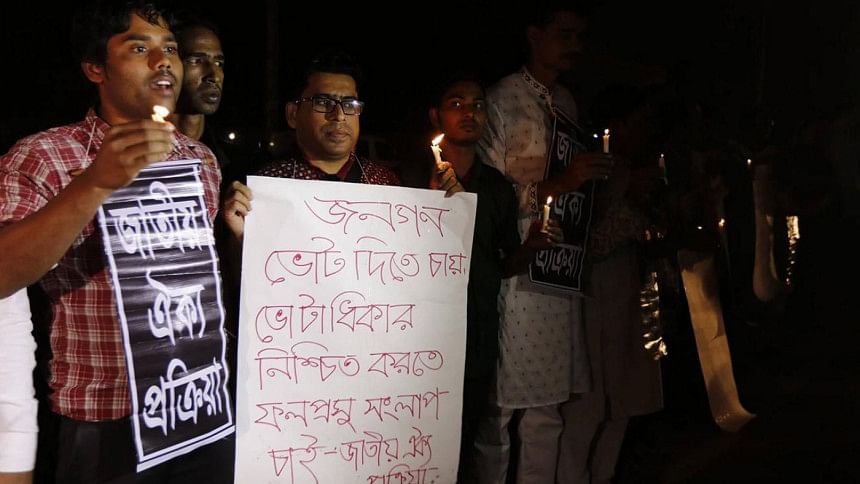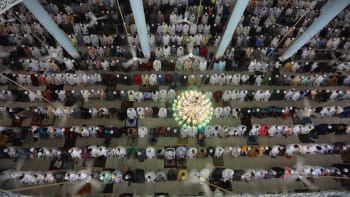Feeling the pulse of the people

Huseyn Shaheed Suhrawardy, one of the founders of Awami Muslim League (now Awami League), chief minister of undivided Bengal, former prime minister of Pakistan and one in our pantheon of "National Leaders" was once quoted as saying, "Bad election is better than no election." This, he had said, in the thick of Ayub Khan's military rule in Pakistan.
By expressing his unqualified preference for election even under a military regime, Suhrawardy perhaps intended to highlight two points: First, the importance of an election as a measure of bona fides of those who held it so as to subject them to public scrutiny, if need be. Secondly, an election yields a verdict on the winner or the loser indicating at the same time the rate of turnout or level of public participation in the process.
In independent Bangladesh, we have come a long way not to settle for just any election but a qualitative one—a free, fair, participatory and credible election. While this has proved elusive; it may not in future. The conditions prevailing prior to the one-sided January 5, 2014 election, what with the BNP's naïve boycott and the AL's hell-bent persistence to hold it, have transformed into a scenario of engagement, interaction and exchanges between all political classes.
Yes, the major demands of the opposition parties and alliances have not been met but the series of dialogues that the prime minister held with different combinations have helped close the ranks of polarised parties, at least with the election in mind. What has jelled as a result is an unwritten consensus on an "inclusive" election.
One head-turner of an outcome of the realignment process is this: Of the 70 Islamic parties, 90 percent have joined the ruling AL-led alliance—riding on Qaumi Madrasah or Hefazat-e-Islam crest. Political Islam's vote bank has shrunk from election to election, for all one knows. Whether they will reverse the pattern back up again, one will be curious to know!
At any rate, all are going ahead with their firm plans to participate in the polls but have ceaselessly demanded a level playing field denied them through arrests and cases filed against their leaders and workers. They say that despite the government's assurances to the contrary and submission of lists of the affected, remedial action was still awaited. The job is cut out for the Election Commission to follow up on the government's commitment in this respect.
Three factors make it obligatory for the EC to meet the legitimate demands of the electoral alliances in terms of facilitating the contests: First and foremost, the EC is empowered, both constitutionally and RPO-wise, to enforce standards of non-partisanship and complete neutrality. That is why all the major functional and operational authorities of the state have been placed at the disposal and under the charge of the Election Commission.
Secondly, the different platforms including the catalytic Dr Kamal Hossain led Oikko Front and the BNP as a party have publicly eschewed any possibility of boycotting the election. By doing so they have, on the one hand, eased the EC's task of assiduously drawing all the major parties in to the election, and on the other increased the responsibility of the EC to prove itself equal to the challenge.
Last but not least, the candidates outside the ruling alliance will be at a disadvantage vis-a-vis the government party candidates, so they will be needing traction! Since most in the ruling party are sitting MPs, they will have entitlements rendering their electioneering that much easier.
Placing new sets of field officials and police administrators with good reputation and professional integrity across the country is a necessary drill for the Election Commission to perform. This is usually done by the electoral authority of major democracies within days of declaring the election schedules.
In this context, it has been reported in a prominent Bangla daily that panels have been created of presiding, assistant presiding and polling officers to be placed on election duties. Police are said to be probing their credentials, one would assume, as a routine and fool-proof necessity.
It is important to note that altogether 40,000 election observers, of local and international origins, are expected to operate in Bangladesh. If it comes to that the figure will be much more than that attending the controversy-tainted 2014 election but half the number of attendees in the 2008-09 general election. Therefore, the monitoring would be fairly substantial.
In the end, all concerned would do well to remember an Abraham Lincoln quote: "With public sentiments nothing will fail and without it nothing can succeed."
Shah Husain Imam is Adjunct Faculty at East West University, a commentator on current affairs, and former Associate Editor, The Daily Star.
Email: [email protected].





Comments